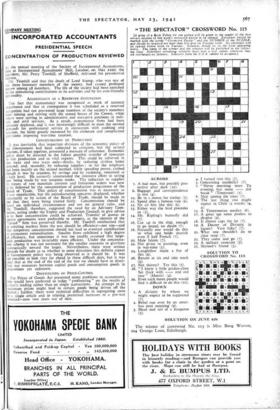COMPANY MEETING
INCORPORATED ACCOUNTANTS
PRESIDENTIAL SPEECH CONCENTRATION OF PRODUCTION REVIEWED Ar the annual meeting of the Society of Incorporated Accountants, ;cid at Incorporated Accountants' Hall, London, on May 22nd, the cresident, Mr. Percy Toothill, of Sheffield, delivered his presidential address.
Mr. Toothill said that the death of Lord Stamp, who was one of the three honorary members of the society, had caused profound sorrow among all members. The life of the society had been enriched his stimulating contributions to its activities and by his ever-friendly personality.
ACCOUNTANCY AS A RESERVED OCCUPATION ACCOUNTANCY AS A RESERVED OCCUPATION The fact that accountancy was recognised as work of national
importance and that in consequence it was scheduled as a reserved N-cupation had not prevented large numbers of the society's members from joining and serving with the armed forces of the Crown, while Dthers were serving in administrative and executive positions in mili- :arv and civil services. As a result, accountancy firms had been e.riously depleted, and it was increasingly difficult to meet the normal demands for professional service in connection with auditing and taxation, the latter greatly increased by the elaborate and complicated provisions imposing war-time taxation.
CONCENTRATION OF PRODUCTION
It was inevitable that important divisions of the economic policy of the Government had been subjected to criticism, but the several ,chemes, if taken together, presented a measure of coherence. Economic policy must be directed to the fullest possible transfer of resources T war production and to vital exports. This could be achieved in two ways and two ways only-firstly, by reducing civilian home demand, and, secondly, by reducing supplies ; so far the emphasis had been mainly on the second method, while spending power, curbed though it was by taxation, by savings and by rationing, remained at a high level. He earnestly commended the intensive effort to saving how being made by war weapons weeks. The reduction in supplies iv means of raw materials controls and limitation orders was now to be followed by the concentration of production programme of the Board of Trade. This policy of concentration was as necessary as it was unpalatable, but the manufacturing concerns displaced, whether voluntarily or by action of the Board of Trade, should be made to feel that they were being treated fairly. Concentration should be based on individual circumstances and not on general rules, and Mr. Toothill, therefore, suggested the need for an Advisory Cont- mittee, acting under the Export and Production Council, to give advice as to how concentration could be achieved. Transfer of quotas or agency agreements were preferable to mergers, as the identity of the "closed" firm was preserved thereby. Mr. Toothill emphasised that in selecting nucleus firms the test should be efficiency-not size-and that temporary concentration should not lead to eventual cartellisation or permanent rationalisation. Smaller firms exhibited a high degree of efficiency, but sometimes it was too readily assumed that large- scale production was invariably more efficient. Under the concentra- tion scheme it was not necessary for the smaller concerns to gravitate automatically toward the larger. Nevertheless, there were serious grounds for doubt as to whether in some directions this definite aspect of Government policy was being observed as it should be. It was not possible to look very far ahead in these difficult days, but it was clear that at the end of the end of the war we should have to distri- hute our resources between capital goods and consumption goods in proportions yet unknown.
DIFFICULTIES OF PRICE-CONTROL
The Prices of Goods Act presented many problems to accountants, who would have preferred to judge " profiteering " on the results of a year's trading rather than on single transactions. An attempt to fix maximum prices might lead to certain goods being driven off the market ; further. there were technical difficulties in segregating costs to a single article and in relating permitted increases to a pre-war standard-now two years out of date.






























 Previous page
Previous page